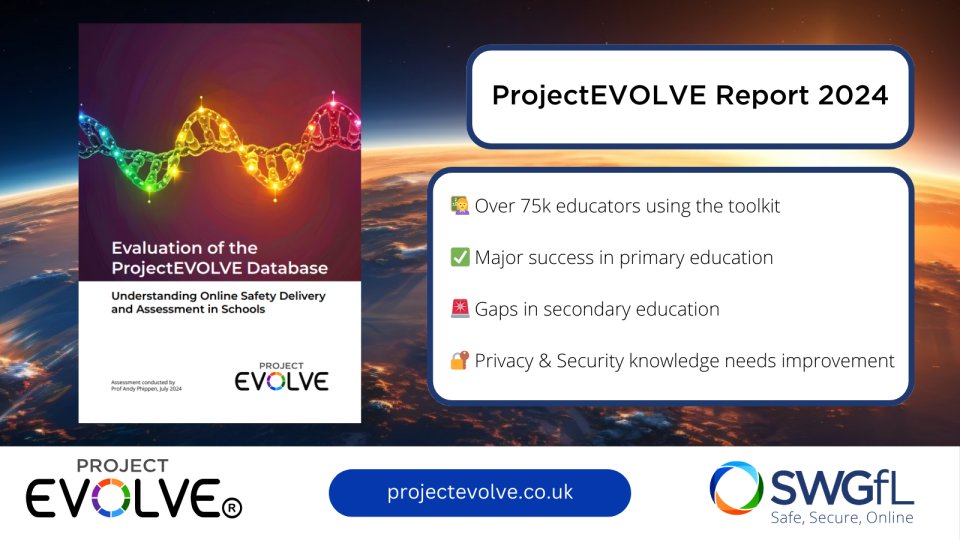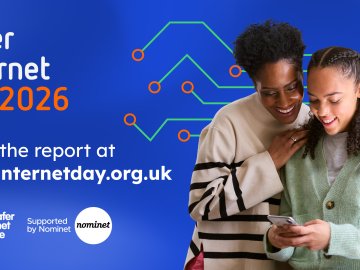At our latest online event, earlier this month, Ken Corish and guest speakers Sara Pike (Primary School teacher from Devon) and Naomi Lofkin (Digital Marketing Expert from SWGfL) detailed the advancements and impact of ProjectEVOLVE, our innovative toolkit aimed at enhancing digital literacy and online safety across the education sector. The event, which highlighted the latest findings and upcoming features from ProjectEVOLVE, was attended by educators and professionals primarily from across the UK looking to further integrate digital literacy into their curriculums.
A Comprehensive Tool for Digital Literacy
Ken Corish introduced ProjectEVOLVE as a robust toolkit consisting of over 600 resources, catering to all age groups, from early years to young adults covering key areas of digital literacy. The tool is grounded in the UK’s Education for a Connected World framework, which outlines the core digital skills children and young people need in today's connected society.
At the heart of ProjectEVOLVE is its innovative assessment Knowledge Maps, which helps educators identify students’ learning gaps, tailor resources to those needs, and measure impact effectively. Ken shared the platform’s growth, with 16,000 organisations and 75,000 users globally, from over 120 countries.
A striking 3.7 million responses have been generated since the introduction of the Knowledge Maps, providing valuable insights into students' understanding of digital literacy. These insights have shaped the ProjectEVOLVE Annual Report, produced by Professor Andy Phippen, a professor in digital ethics from Bournemouth University.
Sara Pike, a local primary school teacher and computing lead, was able to share with us how her school has adopted ProjectEVOLVE into their curriculum and how it has supported in identifying knowledge gaps with students as well as the challenges faced with educating around this complex area.
Key Findings from the 2024 Project Evolve Report
The 2024 ProjectEVOLVE Report presents critical data on students’ digital literacy, highlighting both strengths and areas for improvement. One of the key trends identified is the stronger focus on social and emotional aspects of digital engagement, such as online relationships and bullying, compared to other areas like privacy and security.
While these social and emotional areas are easier to integrate with existing curriculums, Ken emphasised the need to address "cumulative risks" that students face online, such as lower-level but high-frequency challenges that are often overlooked. Despite substantial progress in areas like health and wellbeing, significant gaps remain in privacy and security, even as schools increasingly focus on cybersecurity education.
Enhancements to ProjectEVOLVE
The event also showcased new additions and future plans for ProjectEVOLVE. A new online tool, ProjectEVOLVE EDU, was launched in February 2024 to address the need for enhanced online safety training for educators. As Naomi explained, this platform helps teachers stay current with trending online safety topics, such as misinformation, providing them with the confidence to handle evolving digital challenges in the classroom.
Looking ahead Ken also announced the upcoming launch of ProjectEVOLVE Safeguarding, a video training platform designed for safeguarding professionals. This initiative will provide tailored resources for designated safeguarding leads, offering them critical training to deal with the complex issues they face in their roles.
A Data-Driven Future
A significant portion of the event focused on the use of data to refine the online toolkit. ProjectEVOLVE has generated a vast amount of data, particularly through its Knowledge Maps, which provide a detailed understanding of where students excel and where they need further support. These insights will guide future developments, including the potential integration of AI-powered customisation to adapt content to specific learning needs, including Special Educational Needs and Disabilities (SEND) pathways.
Ken also hinted at the possibility of developing a ninth strand focused on AI and emerging technologies, following UNESCO's steps in establishing a competency framework around AI. This would align ProjectEVOLVE with the rapidly changing technological landscape, ensuring students are prepared for future challenges.
Educating in the Digital Age
ProjectEVOLVE has become an essential tool for schools worldwide, supporting educators in teaching digital literacy and online safety. As the toolkit continues to evolve, its focus on data-driven decision-making, enhanced teacher training, and addressing complex digital challenges will ensure it remains at the forefront of digital education.
With new developments on the horizon, including the expansion of safeguarding resources, ProjectEVOLVE is well-positioned to meet the growing demands of education in this complex area. The commitment to innovation and collaboration, as highlighted throughout the event, ensures that ProjectEVOLVE will continue to empower educators and students in navigating the digital world safely and effectively.






